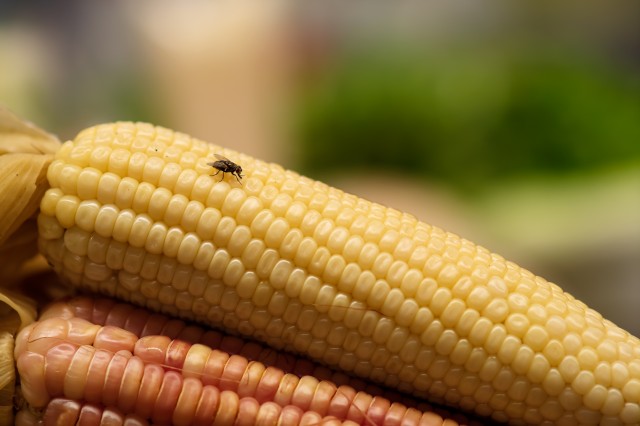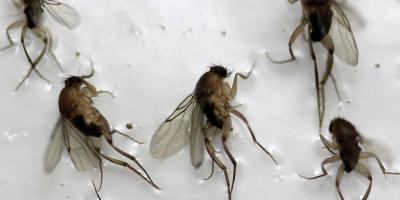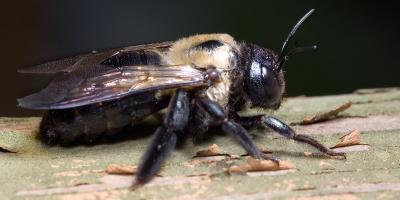5 Tips For Keeping Flies Out Of Your Grocery Store

For food retailers of all sizes, autumn is a critical time of year when it comes to pest prevention.
With temperatures dropping all across the northeast, businesses ranging from large supermarkets to small independent grocers will struggle with a variety of fall invaders. Few pests, however, have proven to be more persistent, more difficult to manage, and more harmful to a grocer’s reputation than flies.
Whether you’ve dealt with fly issues in the past or are simply looking to keep your customers and staff safe from the spread of fly-borne disease, there are a variety of basic fly-prevention strategies all grocery stores and food retailers should follow.
Here’s a look at the five most important strategies for keeping flies out of your retail food facility.
1. Follow Proper Waste Disposal Practices
Of all areas likely to attract flies and other fall invaders in your food retail facility, your waste disposal area is the most likely to bring pest problems if left unattended.
When food is left to degrade in a dumpster or food compactor, it is generally less likely to be disturbed by human interaction. Combine this lack of disturbance with the presence of easy-to-reach food bits - especially sugary fruits, vegetable scraps, and meats - and your waste disposal area may just be the perfect place for a fly to settle in and lay eggs.
That’s why it’s critical to keep your waste disposal area well maintained and well cleaned as often as possible. Make sure your waste area is as sealed from the outdoors as possible, with a well-fitting lid or closure system free from any gaps, cracks, or holes where pests can make their way in.
It may also be in your best interest to increase the frequency with which your waste is taken away, as the longer food scraps are left to rot the more likely your waste area will attract pests and other flies. Many grocers opt for weekly trash removal services, while others may require daily removal or even more frequently to keep pests from establishing a permanent base.
2. Thoroughly Clean all Food Preparation Areas
Unlike your customers, flies and other pests will not be deterred by unsanitary conditions when looking for food or water. That’s why it’s critical to keep all of your food preparation areas - including all sections of your store, from meat to produce to bakery and beyond - as clean as possible, even during use.
Dirty production areas have a tendency to build up food debris, especially difficult-to-clean substances like fats and oils that may run off from meats and other foods. Once set, these messes can be particularly difficult to clean up - and may provide the perfect spot for flies to eat and start laying eggs.
Unclean production areas also carry the risk to more effectively harbor diseases and foodborne illnesses than clean areas, and this can include fly-borne diseases. According to the 2011 Food Safety Modernization Act from the Food and Drug Administration, the burden of illness prevention now falls more squarely on producers and retailers to prevent the spread of disease - meaning there is even greater impetus to keep your spaces clean and free from flies.
Grocers and food retailers should adhere to strict cleaning regimens including multiple rinses, antibacterial soaps, and disinfecting solutions to ensure all food particles, residues, and surface bacteria are fully removed.
3. Control Moisture and Reduce Standing Water
As important as thorough cleaning may be to your grocery store’s continued fly-free operation, almost equally important is keeping moisture levels and standing water at an absolute minimum at all times.
Flies specifically seek out reliable sources of moisture before settling in to lay their eggs. Because water is necessary for their success in reproduction, flies will specifically look for leaks in plumbing systems, clogged drains, leaky refrigeration units, and other water sources to serve as their base of operations.
Aside from attracting flies and other pests (including rodents and birds), standing water or water leaks can also contribute to the spread of mold throughout your grocery store, and so should be cleaned and repaired as quickly as possible as soon as they are spotted. It may be necessary to have an experienced pest professional identify possible leak areas and work toward professional remediation.
4. Adhere to Rigorous, Recorded Cleaning Schedules
Even the most diligent, thorough cleaning regimen can have its overall benefits seriously hampered by lack of a quality recording process.
By diligently recording when and where you undertake proper cleaning, you make it significantly easier to analyze what cleaning strategies are effective and which are not; which areas require a higher degree of cleaning; and where particular problem areas prone to flies may exist in your facility.
Processes like Food Safety Inspections and audits may become (or already are) a key part of your cleaning accountability procedure, when a facility may be called on by a Health Inspector to prove adherence to particular cleaning requirements. Additionally, a pest professional called in for expert fly remediation may require some kind of broader look at your existing cleaning regimen, careful recording may also significantly bolster your pest prevention efforts down the road.
5. Provide Regular Employee Training
A good general knows that no battle plan will be effective if the troops on the ground aren’t well trained. The same is generally true for fly prevention in grocery stores: no matter how diligent you may be, it won’t mean much if your staff is not kept fully informed.
That’s why it’s important to provide regular, robust, and recorded employee training centered on pest prevention for all of your staff. All too often, staff members may feel a fear of punishment for pointing out fly or other pest problems, especially during busy periods when customers are most likely to be present. This silence, however, only encourages pests to continue to infest your area unopposed.
Because the best weapon against any fly invasion is early action, it is critical that your staff know what to do when they notice pests in your grocery store and that they feel empowered to raise the alarm early.
Don’t Let Flies Take Over Your Store. Call A Pest Professional.
If your grocery store, supermarket, or other food retail facility has struggled with fly problems in the past, the solution may be a lot less difficult than you might think.
An experienced pest professional can help you figure out exactly where the gaps exist in your prevention efforts and close those gaps, as well as create a proactive strategy for preventing pests and other flies from disturbing your facility, your customers, your reputation and, ultimately, your profits down the road.
If you’re ready to take serious action against flies, get in touch with our commercial pest control specialists at JP Pest Services. From immediate fly remediation to long-term Business protection programs, we bring the experience and expertise necessary to keep your facility fly free through any season. Get in touch today and get your business protected - before flies settle in for the winter.



